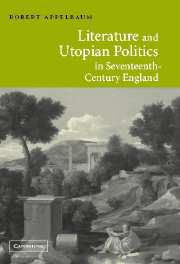Book contents
- Frontmatter
- Contents
- Acknowledgments
- Introduction
- Chapter 1 The look of power
- Chapter 2 Utopian experimentalism, 1620–1638
- Chapter 3 “Reformation” and “Desolation”: the new horizons of the 1640s
- Chapter 4 Out of the “true nothing,” 1649–1653
- Chapter 5 From constitutionalism to aestheticization, 1654–1670
- Notes
- Index
Chapter 2 - Utopian experimentalism, 1620–1638
Published online by Cambridge University Press: 22 September 2009
- Frontmatter
- Contents
- Acknowledgments
- Introduction
- Chapter 1 The look of power
- Chapter 2 Utopian experimentalism, 1620–1638
- Chapter 3 “Reformation” and “Desolation”: the new horizons of the 1640s
- Chapter 4 Out of the “true nothing,” 1649–1653
- Chapter 5 From constitutionalism to aestheticization, 1654–1670
- Notes
- Index
Summary
THE WORLD IN THE MOON, THE NEWS ON THE GROUND
In 1620 Ben Jonson produced the first of a series of court masques which would be remarkable both for their fantastically imperial idealism and the directness of their appeals as royalist propaganda. The series culminates in The Fortunate Isles, where it is said that “That point of revolution being come / When all the Fortunate Islands should be joined,” and Macaria itself, the blessed isle of Greek tradition (and one of the islands mentioned by Hythloday in More's Utopia), has been “Instructed to adhere to [James's] Britannia.” The first of these masques was evidently the most frequently performed court masque during all of James's reign: News from the New World Discovered in the Moon (1620).
“News, news, news!,” the masque opens, with the arrival on stage of a pair of heralds. “Bold and brave news!,” adds the Second Herald. “New as the night they are born in,” says the First Herald. “Or the fantasy that begot 'em” (lines 1–4). The news, it turns out, comes directly by way of the “neat and clean power of poetry”:
2nd Herald. Certain and sure news –
1st Herald. Of a new world –
2nd Herald. And new creatures in that world –
1st Herald. In the orb of the moon –
2nd Herald. Which is now found to be an earth inhabited !
1st Herald. With navigable seas and rivers !
2nd Herald. Variety of nations, polities, laws !
1st Herald. With havens in't, castles and port towns !
2nd Herald. Inland cities, boroughs, hamlets, fairs and markets !
(94–123)- Type
- Chapter
- Information
- Publisher: Cambridge University PressPrint publication year: 2002



